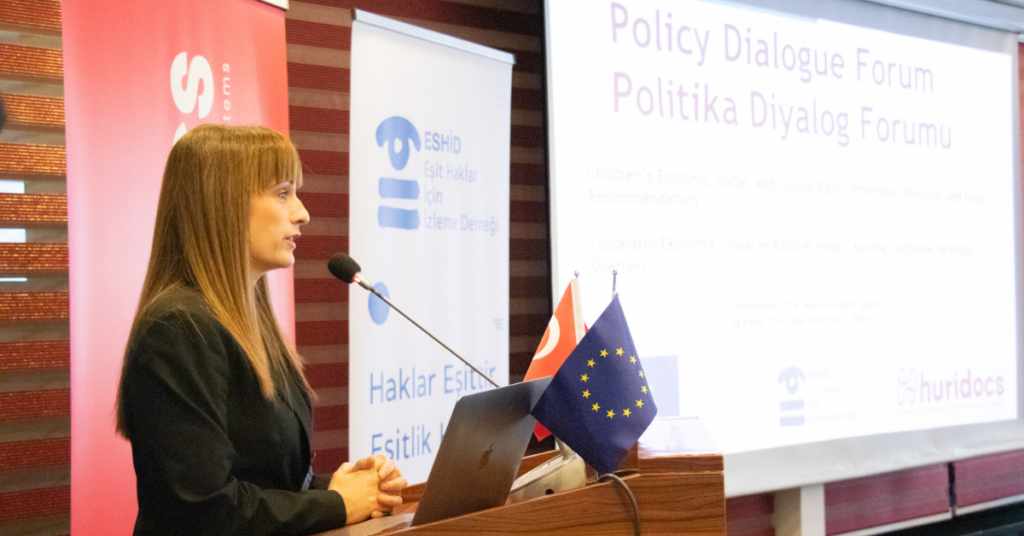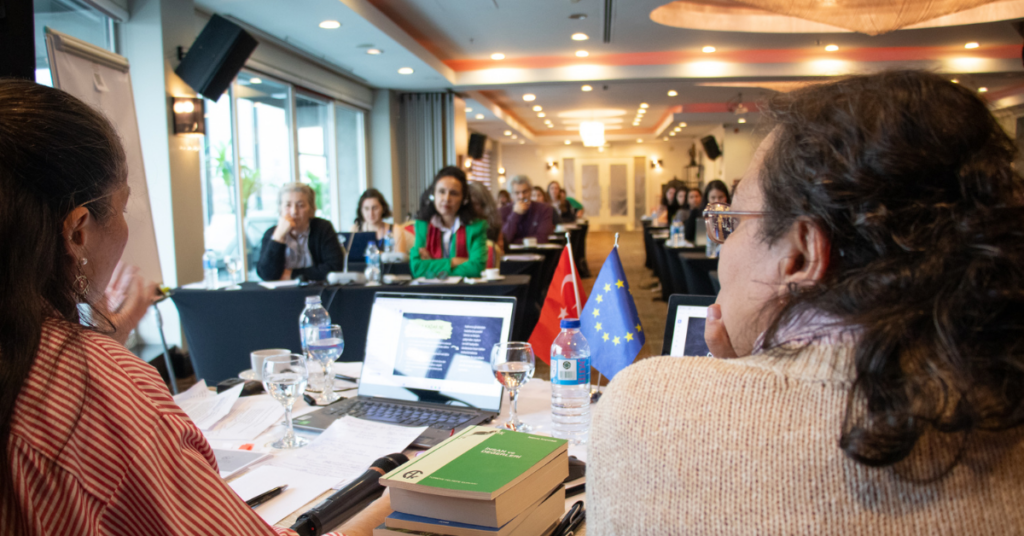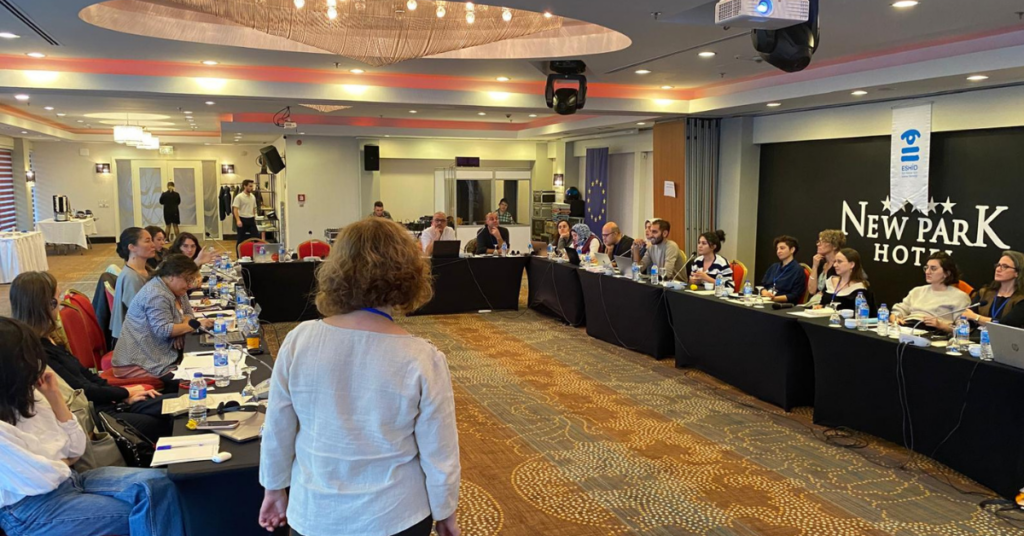Türkçe versiyonunu buradan okuyun.
On 14 November 2024, the Policy Dialogue Forum held in Ankara, brought together civil society organisations, policymakers and local government representatives to showcase the outcomes of the project focusing on the economic, social, and cultural (ESC) rights of minorities in Türkiye. Sub-grantees presented the key findings of the field research conducted during the project.
The Forum aimed to create a solution-oriented dialogue environment among stakeholders to discuss policies for the protection and promotion of the rights of children, based on the research results. The organisations sought to develop holistic, inclusive and concrete policy recommendations to ensure full access to the ESC rights of children, and to discuss the issues together with different stakeholders.
The key topics for discussion included the importance of monitoring children’s economic, social and cultural rights; the problems faced by children in this context; the need for a holistic approach to the creation of policies to protect; and the steps necessary to improve and strengthen the ESC rights of children.
“ The Forum underlined the importance of monitoring the economic, social and cultural rights of the children to identify and address the ongoing challenges and issues children face in accessing their basic rights and to observe the progress in this area.”
Gamze Rezan Sarışen — General Director, AMER.

“Witnessing the enhanced collaboration spirit amongst organisations and collectives that have been systematically ostracised was definitely one of the highlights of the event. Providing a space for the sub-granted clusters, civil society in general, academics and public officials in which they raised their voices and shed light on the flaws and violations of the rights of children in Türkiye was a significant step towards bottom-up data-informed policymaking in the country.”
Lucía Vicente Gómez — Programme Manager, HURIDOCS
Read the main recommendations and insights of the Policy Dialogue Forum Report, available in English and Turkish:
The next day, HURIDOCS and AMER held a morning event with the first-cycle sub-grantees for a feedback session. Participants shared feedback on the use of the Uwazi platform, appreciating its systematic approach but noting areas for improvement, such as user-friendliness and better resources for data analysis.
The discussions emphasised ethical data use, compliance with local regulations, and fostering collaboration among civil society networks. Participants highlighted the importance of tailoring training to specific needs and integrating tools effectively into ongoing projects.
This was followed by an afternoon event with the civil organisation of the first and second-cycle sub-grantees for an exchange of experiences event.
“After months of remote work, meeting in person brought a renewed sense of energy to our efforts. The feedback and encouragement from first-cycle participants, combined with the enthusiasm of new participants, highlighted the growing community and sustained momentum of this initiative. This meeting was crucial for reinforcing the community built during the first cycle while paving the way for second-cycle participants to build on that foundation. It not only introduced the project to the second cycle but also created valuable opportunities for collaboration, leveraging the outputs of the first cycle to support broader ESC rights advocacy, data-driven policymaking, and stronger local engagement. Witnessing this vibrant exchange of lived experiences and seeing the project’s practical applications in real time was deeply inspiring.”
Oleksandra Kovalenko — Programme Officer, HURIDOCS
Advancing ESC rights for minorities in Türkiye

The European Union-funded project “Strengthening cross-sectoral partnerships to advance economic, social, and cultural (ESC) rights of disadvantaged groups” is co-led by HURIDOCS and AMER and is dedicated to empowering minority communities in Türkiye. HURIDOCS brings technical expertise and more than four decades of experience in documentation and advocacy, while AMER contributes a profound understanding of the Turkish context and a commitment to advancing the rights of disadvantaged groups.
After the selection of sub-grantees in October 2023, eight civil society organisations worked in three clusters to strengthen the ESC rights of children. The project focused on setting up digital information repositories for each cluster to monitor, document, and manage information on violations of ESC rights. Additionally, training was provided on the use of digital tools for data collection, protection, and management. The findings from these efforts were presented in the aforementioned Policy Dialogue Forum on 14 November 2024.

“Being a cluster, that is, a community has enabled us to understand more clearly how to manage participatory and transparent processes, how to diversify risk and solution detection and therefore take more prepared, confident and realistic steps, and how to localise, that is, to give importance, care and priority to local knowledge-experience-idea.
“One of our main learnings is that we have realised that presenting, using, managing and protecting data is as critical as collecting and analysing it. The fact that the communication between project managers and beneficiaries within the project structure is not one-sided but dialogical is a tip we will always share from now on in terms of ‘how to structure sub-grant programs’.”
Sinem Sefa Akay — Researcher, Uçan Süpürge Derneği
Second cycle of the project

On the afternoon of 15 November in Ankara, the HURIDOCS and AMER teams also met with the second cycle sub-grantees of the project funded by the EU. The meeting was an opportunity to review the project, overview sub-grant applications and for the clusters to present their research projects.
Launched in July 2024, the second cycle selected five organisations and four individual researchers as sub-grantees. These include the Human Rights School – Union Rights Monitoring Network, the Hayat Sende Youth Academy Association (Hayat Sende), and Turkey Children’s Freedom Foundation. This cycle monitors violations of ESC rights with a particular focus on labour rights and strategic approaches under State protection, refugee women’s right to shelter, right to education, right to health, right to work and rights of their children; and the right to education for children/juvenile prisoners in the juvenile justice system.
While HURIDOCS and AMER will follow the same steps and structure as the previous cycle, the process is also being adapted to their specific needs and challenges. The clusters will conduct surveys and case analyses, aiming to create detailed and multidimensional datasets related to violations of ESC rights. They will also receive training on utilising digital tools for data collection, protection, and management. Insights from these initiatives will be shared at the second Policy Dialogue Forum in 2025, fostering collaboration with local experts, human rights organisations, researchers, and local governments.
By leveraging data-driven insights and fostering partnerships, this initiative seeks to empower Turkish civil society to advocate for and advance the ESC rights of disadvantaged groups across the country.
This project is possible thanks to the support of the European Commission in Türkiye.

